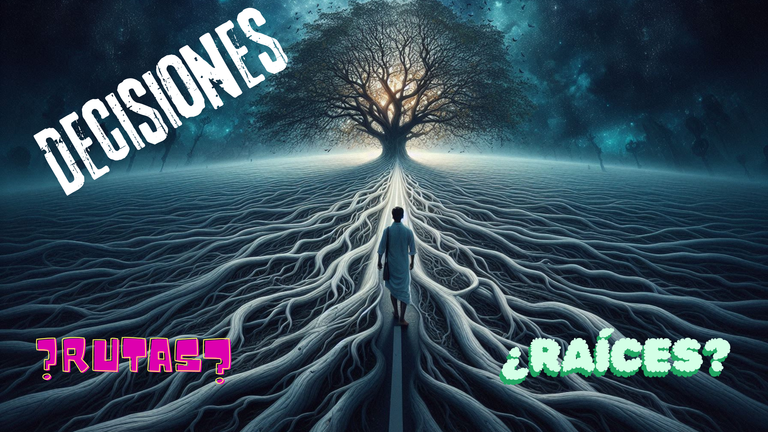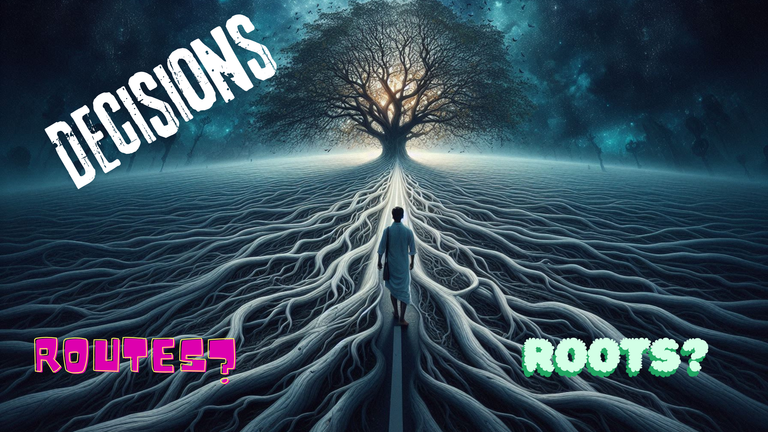
Si nos ponemos a pensar en qué es la vida, cada una y cada uno de nosotros tendrá su propia definición de qué es, en dependencia de sus propias experiencias y aquello que nos ha marcado en nuestros actos y sus consecuencias. Pero si hay algo que objetivamente le de una estructura a lo que llamamos vida, o sea, la vida de las personas, será un constante tomar de decisiones. Las hay irrelevantes, las hay decisivas, pero siempre decisiones que nos llevan a los más sorprendentes destinos. Pero, ¿qué hay detrás de cada una de nuestras decisiones?
A los animales los mueve el instinto; esa atadura biológica que los hace tener una respuesta predeterminada ante cada estímulo presente en el entorno y que está inscrita en el ADN de la especie. Pero al ser humano; nosotros que nos logramos liberar del instinto para evolucionar culturalmente, nos rige otro tipo de condicionamiento: el social, aquel que depende de lo aprendido en el proceso de aprehensión de la cultura, nuestra propia personalidad como resultado del papel activo del sujeto en dicho proceso de aprehensión, y el contexto específico que se presenta a la hora de tomar una decisión. De ahí que dos personas, por muy similares que sean y por muy similares que hayan sido las crianzas que recibieron, serán capaces de tomar decisiones totalmente distintas ante una misma situación.
Como sabemos, las decisiones son elecciones, ponderaciones, presuponen la libertad de elección entre varias alternativas plausibles que puedan acercarnos a nuestra meta. Pero en sí mismas no constituyen nunca la meta. O sea, me refiero a que el objetivo de las decisiones por lo general no será el de alcanzar el objeto meta, sino el de plantear un nuevo escenario donde otras decisiones son posibles. Son como una especie de bifurcaciones que se van haciendo a lo largo de nuestra trayectoria vital, y que van marcando nuestro camino y nuestra forma de ser y estar en el mundo.
Y en ese sentido podemos pensar en que muchas veces solemos achacar a una sola decisión el peso de todo nuestro destino, como si se tratase de algo fatalista y determinante. Sin embargo, somos lo que somos y estamos como estamos no porque en nuestra vida entera hayamos tomado una sola decisión. Si nos ponemos a pensar, somos el resultado de una extensa secuencia de decisiones que nos han hecho llegar hasta el día de hoy, y por la misma razón, serán muchas otras decisiones las que nos harán recorrer el largo camino de alcanzar nuestros objetivos.
Es muy injusto poner tanta presión en tomar una decisión y quizás eso nos esté privando de hacer muchas cosas que queremos. Ese peso totalitario y abrumador nos convierte en esclavos porque nos hace ser personas insatisfechas que viven rechazando tomar cualquier decisión, sin darnos cuenta que el mero hecho de no tomar una decisión, ya es de por sí una decisión, y probablemente la peor que se pueda tomar: la abstinencia.
Ojo, no digo que toemos a la ligera cualquier decisión y que no pensemos con mesura las consecuencias que nos puedan traer. Lo que digo es que las personas se equivocan, cometen errores, en algunos casos aprenden de ellos, en otros simplemente se trata de ensayo-error, tratan de revertir su error, toman nuevas decisiones, pero nunca se detienen. Quizás la causa de nuestra visión fatalista de las decisiones sea consecuencia de filosofías como el estoicismo que plantean que existe un destino inamovible al que hay que aceptar tal y como se presente.
Sí, hay una realidad, pero no se trata de aceptarla, sino de vivirla, experienciarla en carne propia, sentirla y derecho a hacerlo. De hecho, ese «destino» que hay que simplemente aceptar, no es más que resultado de nuestras propias decisiones.
Hasta que no te haces consciente de lo que llevas en tu inconsciente, este último dirigirá tu vida y tú le llamarás destino.
_
Carl Jung
English version

If we stop to think about what life is, each one of us will have our own definition, depending on our personal experiences and the things that have shaped our actions and their consequences. However, if there is something that objectively structures what we call life—or, more precisely, human life—it is the constant act of decision-making. Some decisions are trivial, others are decisive, but they always lead us to the most surprising destinations. But what lies behind each of our decisions?
Animals are driven by instinct—that biological tether that triggers a predetermined response to every stimulus in their environment, inscribed in the DNA of their species. But humans, having freed themselves from instinct to evolve culturally, are governed by a different kind of conditioning: the social one. This social conditioning depends on what we learn during the process of cultural assimilation, on our unique personalities shaped by our active role in this assimilation, and on the specific context we face when making a decision. That is why two people, no matter how similar they are or how alike their upbringing has been, may make completely different decisions in the same situation.
As we know, decisions are choices, evaluations that presuppose the freedom to choose among several plausible alternatives that might bring us closer to our goals. Yet, in themselves, decisions never constitute the ultimate goal. That is to say, the purpose of decisions is generally not to achieve the ultimate objective, but to create a new scenario where other decisions become possible. They are like a series of forks in the road that appear throughout our life journey, shaping our path and our way of being and existing in the world.
In that sense, we often attribute the weight of our entire destiny to a single decision, as if it were something fatalistic and definitive. However, we are who we are and where we are not because we made just one decision in our entire lives. If we think about it, we are the result of a long sequence of decisions that have brought us to this very day. By the same token, it will be many other decisions that will lead us along the long road to achieving our goals.
It is unfair to place so much pressure on making a single decision, and perhaps this prevents us from doing many of the things we want. This overwhelming weight enslaves us, making us dissatisfied individuals who shy away from making any decisions at all—without realizing that the mere act of not deciding is itself a decision, and probably the worst one we can make: abstinence.
Now, I am not saying we should take any decision lightly or fail to carefully consider the consequences they may bring. What I am saying is that people make mistakes, they err, and in some cases, they learn from these mistakes. In others, it is merely a matter of trial and error—they try to reverse their errors, make new decisions, but they never stop. Perhaps our fatalistic view of decisions stems from philosophies like Stoicism, which argue that there is an immutable destiny we must accept as it is.
Yes, there is a reality, but it is not about simply accepting it. It is about living it, experiencing it firsthand, feeling it, and having the right to do so. In fact, that so-called "destiny" we are told to simply accept is nothing more than the result of our own decisions.
"Until you make the unconscious conscious, it will direct your life and you will call it fate."
—
Carl Jung

Créditos | Credits
Imágenes utilizadas | Images used
Todas las imágenes utilizadas son de mi propiedad y fueron generadas utilizando Designer de Copilot y editadas en Canva | All images used are my own property and were generated using Designer from Copilot and were edited using Canva.
Traducción | Translation
Te puede interesar | You may be interested in
Depresión, ¿calamidad o estereotipo? | Depression, calamity or stereotype? [ES/EN]
Las identificaciones como armas de doble filo | Identification as double-edged weapons [ES/EN]
¿Empatía o narcisismo? | Empathy or narcissism? [ES/EN]
Género, ¿ventaja o desventaja? | Gender, advantage or disadvantage? [ES/EN]
La procrastinación más allá de la pereza | Procrastination beyond laziness [ES/EN]
Las normas sociales y la grupalidad: reflexiones | Social norms and groupness: reflections [ES/EN]
Las personas introvertidas y otros demonios | Introverted people and other demons [ES/EN]
El amor no lo puede todo | Love can't do everything [ES/EN]


@tipu curate 8
Upvoted 👌 (Mana: 0/75) Liquid rewards.
Our decision usually takes everything we do with life so anytime we're to decide.
Nuestra decisión suele tomar todo lo que hacemos con la vida por lo que en cualquier momento debemos decidir.
Y siempre lo he dicho: Somos lo que decidimos.
Y decidimos cada día miles de veces.
Un gusto leerte, @genrigp
Ando perdido por trabajo pero espero retomar la frecuencia. Saludos Emilio.
Has sido votado por
PROYECTO ENLACE
'Conectando Ideas y Comunidades'
PROYECTO ENLACE es un proyecto de curación de habla hispana enfocado en recompensar contenido de calidad y apoyar autores en su proceso de crecimiento en HIVE.
Creemos y apostamos por el futuro de esta gran plataforma, y estamos muy emocionados de poder hacerla crecer junto a esta comunidad. Así que te invitamos a publicar en nuestra COMUNIDAD y estar atento a todas las actividades que tenemos preparadas y que estaremos publicando en breve.
¿QUIERES AUTOMATIZAR TUS GANANCIAS DE CURACIÓN? SE PARTE DEL PROYECTO ENLACE APOYANDO A NUESTRO TRAIL EN HIVE.VOTE INGRESA AQUÍ PARA CONOCER LOS DETALLES.
¿QUIERES INVERTIR ENLACE? DESCUBRE COMO HACERLO Y GENERAR INGRESOS DE FORMA SEMANAL MEDIANTE TU DELEGACIÓN DE HP AQUÍ TE EXPLICAMOS COMO.
Te invitamos a participar en nuestro servidor de Discord: https://discord.gg/3S9y7BbWfS
Atentamente
EQUIPO ENLACE 2024